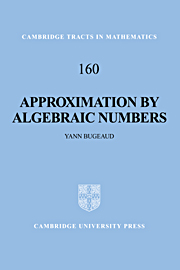Book contents
- Frontmatter
- Contents
- Preface
- Frequently used notation
- 1 Approximation by rational numbers
- 2 Approximation to algebraic numbers
- 3 The classifications of Mahler and Koksma
- 4 Mahler's Conjecture on S-numbers
- 5 Hausdorff dimension of exceptional sets
- 6 Deeper results on the measure of exceptional sets
- 7 On T-numbers and U-numbers
- 8 Other classifications of real and complex numbers
- 9 Approximation in other fields
- 10 Conjectures and open questions
- Appendix A Lemmas on polynomials
- Appendix B Geometry of numbers
- References
- Index
2 - Approximation to algebraic numbers
Published online by Cambridge University Press: 12 August 2009
- Frontmatter
- Contents
- Preface
- Frequently used notation
- 1 Approximation by rational numbers
- 2 Approximation to algebraic numbers
- 3 The classifications of Mahler and Koksma
- 4 Mahler's Conjecture on S-numbers
- 5 Hausdorff dimension of exceptional sets
- 6 Deeper results on the measure of exceptional sets
- 7 On T-numbers and U-numbers
- 8 Other classifications of real and complex numbers
- 9 Approximation in other fields
- 10 Conjectures and open questions
- Appendix A Lemmas on polynomials
- Appendix B Geometry of numbers
- References
- Index
Summary
In this book, we study various questions related to classifications of real numbers and we mainly focus our attention on the approximation of real transcendental numbers by algebraic numbers. In the present Chapter however, we briefly review the most important results which have followed Liouville's Theorem 1.2 and deal with algebraic approximation to algebraic numbers. Since a broad literature is available on this topic, we omit most of the proofs and refer the reader to, for example, the monographs of Mahler [388], Schmidt [510, 512], A. Baker [44], and Feldman and Nesterenko [244] for further information.
Completeness is not the only reason for making this survey. Indeed, some results of the present Chapter will be used in subsequent parts of the book. For instance, Theorem 2.7 (or Theorem 2.6) is crucial for proving the main result of Chapter 7, namely the existence of T -numbers. These real transcendental numbers with very specific properties of approximation by algebraic numbers are defined in Chapter 3.
We divide our exposition into four main Sections, dealing respectively with rational approximation, effective rational approximation, algebraic approximation to algebraic numbers, and effective algebraic approximation to algebraic numbers. A broad variety of methods are needed for the proofs of the results below. In a fifth Section, we briefly mention various applications to irrationality and transcendence statements.
Rational approximation
Let ξ be a real algebraic number.
- Type
- Chapter
- Information
- Approximation by Algebraic Numbers , pp. 27 - 40Publisher: Cambridge University PressPrint publication year: 2004

